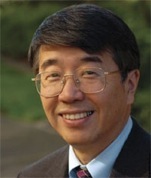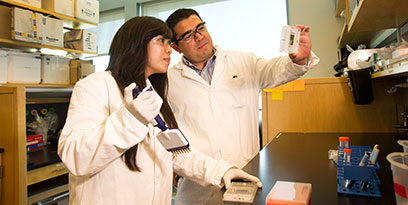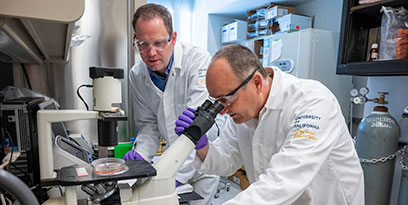Hsing-Jien Kung, Ph.D.

Professor Emeritus
Research III Bldg/UCDMC
Sacramento Campus
Ph: 916-734-1538
e-mail
Research Interests
Dr. Kung's lab is engaged in cancer research with specific focus on the identification of genetic and epigenetic factors contributing to the development of human malignancies including prostate cancer and Kaposi's sarcoma. Under investigations are cellular and viral oncogenes, which are involved in posttranslational modifications of signal molecules and chromatins, leading to malignant transformation. They include tyrosine kinases, E3 SUMO ligases and histone demethylases. In collaborative work, the lab is also involved in developing inhibitors or therapeutic agents which target these oncogenes, resulting in specific and enhanced killing of tumor cells. More recent work has been directed toward the understanding of autophagy (self-eating) as a modulator of apoptosis (self-killing). Efforts are being made to develop effective means to measure autophag and to modulate this process.
Center/Program Affiliation
Libertini SJ, Tepper CG, Rodriguez V, Asmuth DM, Kung HJ and Mudryj M. Evidence for Calpain mediated androgen receptor cleavage as a mechanism for androgen independence and potential therapeutic target in prostate tumors. Cancer Res, 2007. 67(19): 9001-9005.
Liu S, Vinall RL, Tepper C, Shi XB, Xue LR, Ma AH, Wang LY, Fitzgerald LD, Wu Z, Gandour-Edwards R, Devere White RW, Kung HJ. Inappropriate activation of androgen receptor by relaxin via beta-catenin pathway. Oncogene, 2007. 265-273.
Gautschi O, Huegli B, Ziegler A, Gugger M, Heighway J, Ratschiller D, Mack PC, Gumerlock PH, Kung HJ, Stahel RA, Gandara DR, Betticher DC. Origin and prognostic value of circulating KRAS mutations in lung cancer patients. Cancer Lett, 2007. 254(2): 265-273.
Chang YM, Kung HJ, Evans CP. Nonreceptor tyrosine kinases in prostate cancer. Neoplasia, 2007. 9(2): 90-100.
Hong S, Wang LC, Gao X, Kuo YL, Liu B, Merling R, Kung HJ, Shih HM, Giam CZ. Heptad repeats regulate protein phosphatase 2a recruitment to I-kappaB kinase gamma/NF-kappaB essential modulator and are targeted by human T-lymphotropic virus type 1 tax. J Biol Chem, 2007. 282(16):12119-12126.
Shi XB, Xue L, Tepper CG, Gandour-Edwards R, Ghosh P, Kung HJ, DeVere White RW. The oncogenic potential of a prostate cancer-derived androgen receptor mutant. Prostate, 2006. 67(6): 591-602.
Izumiya Y, Izumiya C, Van Geelen A, Wang DH, Lam KS, Luciw PA, Kung HJ. Kaposi's sarcoma-associated herpesvirus-encoded protein kinase and its interaction with K-bZIP. J Virol, 81(3): 1072-1082.
Nair SS, Guo Z, Mueller JM, Koochekpour S, Qiu Y, Tekmal RR, Schüle R, Kung HJ, Kumar R, Vadlamudi RK. Proline-, glutamic acid-, and leucine-rich protein-1/modulator of nongenomic activity of estrogen receptor enhances androgen receptor functions through LIM-only coactivator, four-and-a-half LIM-only protein 2. Mol Endocrinol, 2006. 21(3):613-624.
Desai SJ, Ma AH, Tepper CG, Chen HW, Kung HJ. Inappropriate activation of the androgen receptor by nonsteroids: involvement of the Src kinase pathway and its therapeutic implications. Cancer Res, 66(21):10449-10459.
Ma AH, Xia L, Desai SJ, Boucher DL, Guan Y, Shih HM, Shi XB, deVere White RW, Chen HW, Tepper CG, Kung HJ. Male Germ Cell-Associated Kinase, a Male-Specific Kinase Regulated by Androgen, Is a Coactivator of Androgen Receptor in Prostate Cancer Cells. Cancer Res, 2006. 66(17):8439-8447.
Upper division courses
- 192 Internship in Biological Chemistry
- 198 Group Study
- 199 Special Study for Advanced Undergraduates
Graduate courses
- 231 Biomedical NMR (same as BPH 231)
- 291 Human Genetics Seminar
- 298 Group Study
- 299 Research
Professional courses for medical students
- 410A Molecular and Cell Biology
- 410B Cell Biology and Metabolism
- 498 Group Study
- 499 Research




